Hello, this is Shimizu from Public Relations.
Overseas training in March 2019 in Matsuo’s lab to visit research institutions and companies involved in artificial intelligence and robotics in the United Kingdom.
In this issue, we will report on the training.
[itinerary ——————
March 11, London
Visit to Lloyd’s of London, JR Tokai London Office and JETRO
March 12 Oxford London
Visit to Oxford University, Oxford University Innovation and SMAP Energy
March 13 London
Visit to Imperial College London Robot Learning Lab and Facebook London Office
March 14 Edinburgh
Visit to Edinburgh Centre for Robotics Laboratory
———————-
The participants of this training program introduced some of the places they visited.
Visit to Robotics Laboratory
During this overseas training program, the students visited and discussed with robotics labs in London and Edinburgh.
Imperial College London Laboratory Visit
Imperial College London is a world-class, prestigious university specializing in science, engineering, and medicine, and this time we visited the Robot Learning Lab, which is particularly strong in robotics research. The walls and windows of the campus were covered with various chemical structural formulas and mathematical formulas, creating quite a creative atmosphere.
After introductions of both laboratories’ research, we had a discussion about each other’s research. When Matsuo Lab introduced their research, the participants were interested in their research on robotics, and asked questions especially about food processing and the construction machinery control research being conducted by DeepX, a company founded by a Matsuo Lab alumnus.
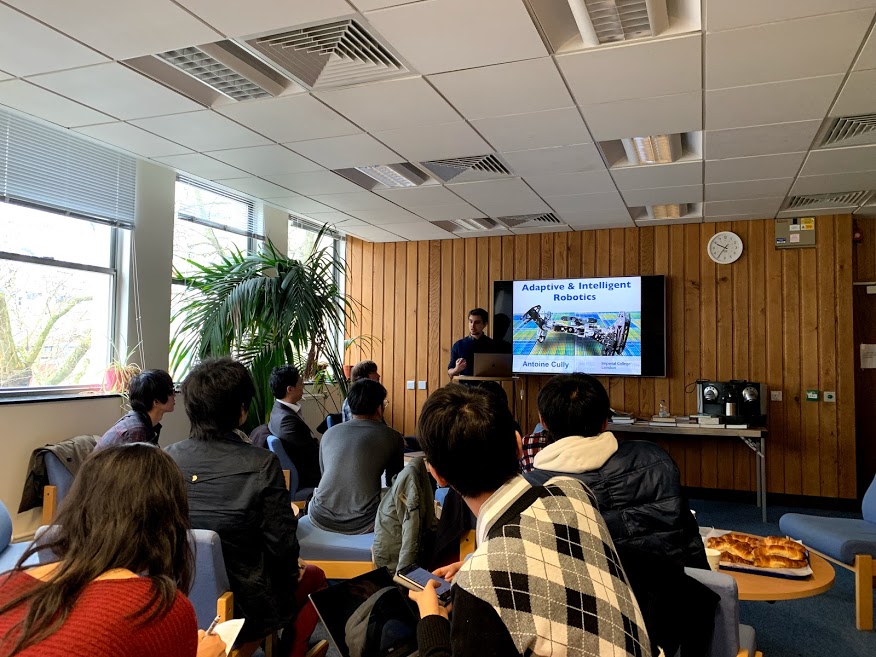
Discussion with Robot Learning Lab members
Edinburgh Centre for Robotics Laboratory Visit
The Edinburgh Centre for Robotics is a British research institute consisting of several universities, mainly the University of Edinburgh, and in recent years has been strengthening its collaboration with RIKEN in Japan in the fields of machine learning and robotics. We were given a tour of the University of Edinburgh and Heriot-Watt University, and were overwhelmed by the sheer number of robots. There were arm robots for factories, robots for home use, robots for Mars exploration, four-legged robots for transportation, and even a simulated home space for robots. I asked, “The facilities are very well equipped, but how are you learning the robots? Do you model the entire environment? We were impressed to hear him say, “We don’t need a simulator because we have the actual robot. In addition, Lego, toy trains, dolls, and 3D-printed tools were displayed in various places along with robots, creating a space that seemed to be overflowing with ideas for robotics research. After returning to Japan, this culture was quickly adopted at the Matsuo Lab, and now the robotics space in the lab is filled with toys and furniture.
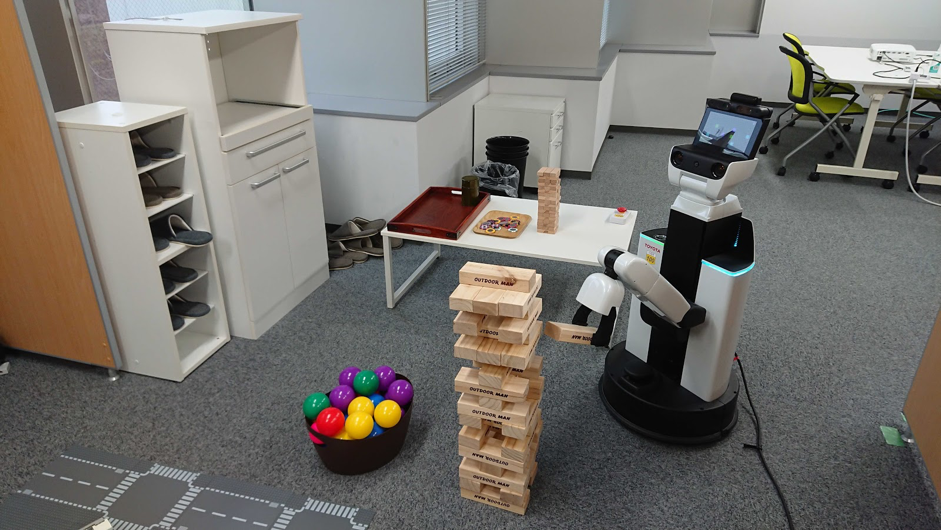
Current view of the robotics space at Matsuo Laboratory. Recently, we have been actively working on the application of deep learning to the robotics domain.
Activities in London
Reception with the British Red Gate Alumni Association
On the first night of the activity, we had a chance to have dinner with members of the Akamon Gakujukai (Akamon Society), a community of Todai alumni in the UK. Akamonkai is held in more than 20 locations around the world, including the United Kingdom. Despite the short notice, more than 30 alumni attended this year’s event.
The participants were from a wide variety of fields, including international students, finance, incubators, lawyers, etc. At each table, there was a lot of talk about the use and future potential of deep learning in various industries.
Through this dinner meeting, I felt that the importance of strengthening cooperation with experts in various fields and applying technology to the real world will further increase in the future, and I strongly realized that deep learning is a field that still has room for growth.
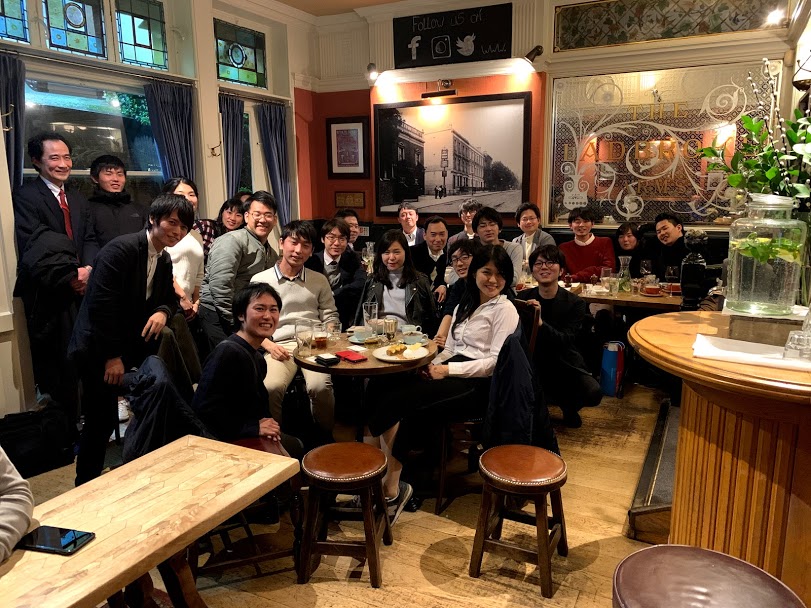
Reception with members of the British Red Gate Alumni Association
Visit Oxford
On the third day, we headed to Oxford in the morning to talk to Mr. Tonegawa, a committee member of the British Red Gate Alumni Association, about the activities of the association and life in Oxford. We are very grateful to Mr. Tonegawa for introducing us to the places we visited during this training program. We walked around Oxford and had lunch and socialized with a student group called AI society. I was very much impressed by their story that they have Tensorflow code examples on their wall and that they participate in Kaggle as a member of AI society. We exchanged opinions at Oxford University Innovation, which fosters university-launched ventures.
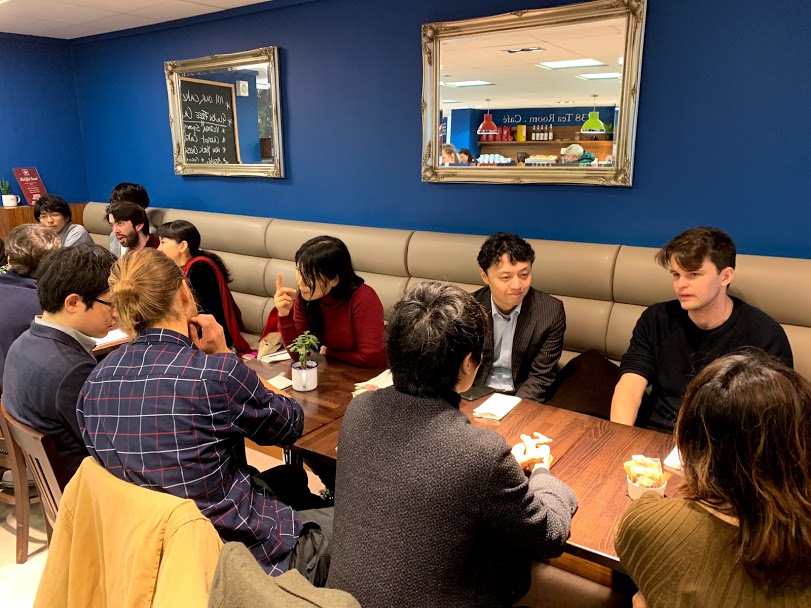
Interaction with students in Oxford.
Visit to SMAP Energy
I was able to visit SMAP energy on short notice due to an early end to my schedule in Oxford. I was impressed by the diversity of the participants who were in charge of making this trip appointment, in that they were able to make additional appointments as the schedule changed.
Mr. Joguchi of SMAP Energy came out to the street in front of the building where his office is located and welcomed us in a friendly manner. Once inside, we were told that although the office was small, the business they were doing was expanding rapidly, especially in Japan, where smart meters are becoming more and more popular, and the business was going quite well.
The presentation explained the service that uses the vast amount of information collected through the use of smart meters, one of the company’s businesses, to set electricity rates at rates that are desirable for both the electric power company and the users. Using gamification techniques, he explained how incentives are given to users to shift their electricity usage from times of high electricity demand to times of low demand, thereby lowering the cost of electricity production. I thought this could be understood as the concept of peak-shifting rates as discussed in classical economics, only more detailed, on an individual and time-of-day basis. Theoretically, this is an ideal allocation of resources, and the fact that we were able to achieve this was wonderful, both as a concept and as a technology.
It was very inspiring to hear that SMAPEnergy will be taking on the global market as smart meters become more widespread around the world in the future. At the end of the trip, we took a commemorative photo of the two founders of SMAPEnergy and all the members of the lab trip huddled together in a small square in front of their small office. It was an opportunity for me to think about my own future, considering that a company with such a small office has the potential to become a huge company in a few years.
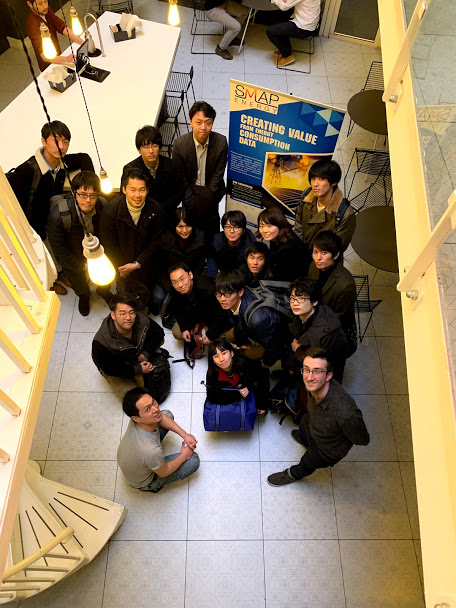
Group photo with SMAP Energy members.
Visit to Facebook London Office
On the fourth day, Mr. Furumi, who works at Facebook’s London office, gave us a tour of the office. Because of the large number of people, we were accompanied by a staff member (!) who specializes in office tours at short notice. The tour was accompanied by a staff member who specializes in office tours (!). In addition to Facebook itself and Messenger, there is also a department in charge of Oculus and a work space for a venture company in which Facebook has invested.
The entranceway had just been decorated for St. Patrick’s Day. Once inside, the office had an atmosphere typical of an overseas IT company, with artwork and movie sets everywhere. It was also filled with fine humor, such as the names of conference rooms being the names of proverbs and movies. The names of the meeting rooms seem to be hard to remember due to their varying lengths, but a system for searching not only the meeting rooms but also which employees are where has been created on the information board so that they can be found quickly. In addition, tablets equipped with a reservation system are installed in the meeting rooms, making it easy to make reservations up to the last minute. In this way, the convenience of office facilities is enhanced by the system developed in-house. Not only that, but the conference room reservation system also has a mini-game that can be played (for some reason) when certain operations are performed. This feature was created through an in-house hackathon. The hacker spirit (or is it just the student spirit?) is evident in the way notices of the in-house hackathon are posted all over the office. The company culture of solving various problems with the hacker spirit (or is it just student spirit?) can also be felt.
We also had lunch at the company cafeteria. It was buffet style, and on the screen in the cafeteria, there were pictures of employees who have been with the company for X years, etc. on the screen. This was a very Facebook-like atmosphere. Afterwards, we had time for a Q&A session with Mr. Furumi directly in the conference room. What particularly impressed me was the importance of selecting team members. The office we visited this time is also the second office in London, and they are still hiring a large number of people. In order to keep the company running smoothly, it is important to attract people who fit the company’s culture, not just so-called “good people.
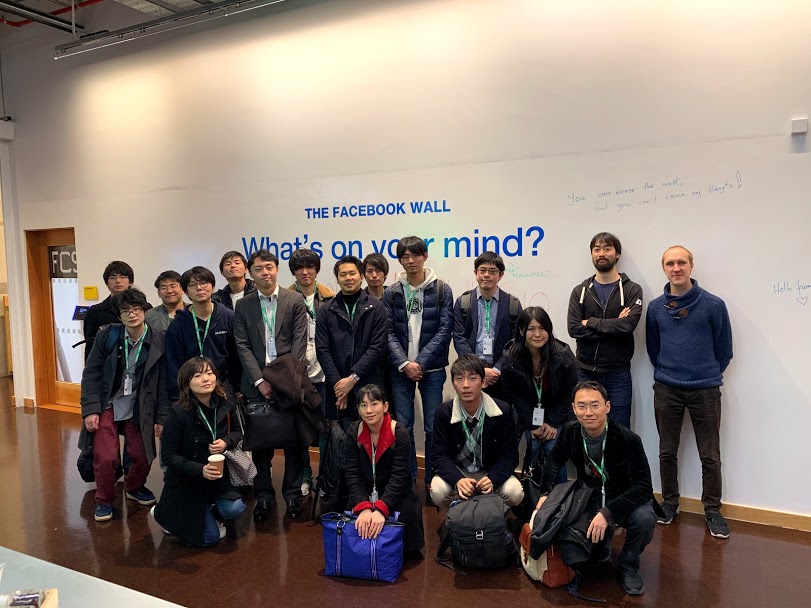
At Facebook London office.
Through a visit to London – Communication Society, London
In London, we visited several companies and institutions. London is home to many offices of prominent companies, but why do so many of them gather in London? When asked repeatedly at the places we visited, the answer was “because this is London.
As we delved deeper into the conversation, the essence of what we found was that many companies place great importance on participating in a community where many companies gather and interact with each other. But why are these companies choosing London as their European base?
The most important reason for this is that London is a geographically small city, and many branches of famous and huge companies are based in that small area, which makes communicating with them extremely efficient. Indeed, we visited six locations in London during our visit, and when we went around them, we realized that all of them were close to each other and within a short distance by car or on foot when traveling. Even the places we were suddenly able to visit were easy to get to, and most of the other places we were not able to visit this time were within a 20-minute drive. Compared to Tokyo, London’s subway system runs at a slower speed and cars cannot drive as fast. Even under such circumstances, I felt that the proximity in terms of time was an advantage when communicating with people.
And as we talked to them, we found not only a close proximity between companies, but also a community in London that is not bound by corporate boundaries. according to a Facebook employee, there is a strong flow of human resources in London, but the high number of job transfers deepens the connections between companies. They said that the talent that flows in often makes new connections at the places to which they move, and collaborations between companies are often born. In addition to inter-company interactions, I felt that interactions among employees are also more important than in Japan. For example, Facebook places a high priority on interaction among employees, and seems to be making serious efforts, such as a system in which employees who are not involved in work can eat and drink together once a week at a restaurant of their choice.
That is all.
The Matsuo Lab aims to broaden the perspectives of students and other lab members every year in this way,
We actually go overseas to inspect local companies and interact with researchers.
We hope that this experience will lead to personal growth as well as future research.

